In this good practice note, Muhammad Ashraful Habib, Swati Nayak and Subhasmita Mohapatra discuss their experiences with promoting a community-based rice seed entrepreneurship model in Northern Bangladesh. Though nurturing local women’s groups in quality seed production can empower them both socially and economically and promote varietal diversity, they underline the importance of sustaining these efforts through contributions from several other actors.
CONTEXT
Food security is paramount in Bangladesh, which has a high population density (1329 people per km2) and poverty rate (18.7%). Seed is a critical input in agriculture. The timely use of quality seeds of potential varieties can increase yields by up to 25%. Currently, about 46% of the farmers in the country use quality seeds, both due to a lack of awareness of the right varieties and their potential, and their timely availability. Therefore, ensuring the supply of good quality seeds is essential, and for cereals in particular. In general, seed systems promote limited high-yielding varieties which have been gradually eroding crop diversity. Location-specific evaluation and adoption of appropriate varieties can address this concern.
COMMUNITY-BASED RICE SEED ENTREPRENEURSHIP MODEL (CBRSEM)
Women are often an integral part of crop production, and in crops like rice, they are responsible for labor-intensive operations like transplantation and harvest. They also manage post-harvest processes like seed storage. Yet, their contribution is often unacknowledged because the activities they are engaged in don’t involve cash transactions. Since women have been involved in rice production for years, training them and developing their skills in Quality Seed Production (QSP) is one assured way of enabling women’s entrepreneurship and promoting seed security. Thus, a Community-based Rice Seed Entrepreneurship Model (CBRSEM) promoted by the International Rice Research Institute (IRRI) was initiated in Rangpur Division of Bangladesh to capacitate women farmer groups to pool their resources and use their expertise for the creation of community-level resilient seed systems.
GOOD PRACTICES
Building on the Strength of NGOs to Organize Women Seed Producer Groups
Rangpur Dinajpur Rural Service (RDRS), an NGO, works with farmer communities to increase the productivity of crops and promote climate-resilient agriculture. It reaches out to women farmers and forms federations to engage them in various income-generating activities. In 2019, IRRI collaborated with RDRS and identified enthusiastic women rice producers with some knowledge of seed production. Meetings were organized to discuss the idea of women’s rice seed production groups among the federations. The goals, outcomes, and benefits of such groups were explained to the members and their feedback and concerns were considered.
Training Women’s Groups
In the same year, IRRI started training two groups — Khoddokomorpur Women Union Federation in Gaibandha district and the Alampur Union Federation in Rangpur district – comprising of 100 women members each. The members of were chosen based on their farm size, cropping patterns, experience in rice seed production and marketing, and involvement in previous training. The trained groups realized the potential of rice seed-based businesses and were motivated to engage in the seed-based business as it would help them access quality seeds and crucial information and guidance during crop production.
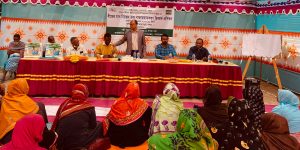 Training on Seed Storage by RDA at Bogura
Training on Seed Storage by RDA at Bogura
Though the training programs are mostly centred around quality seed production, the focus shifts depending on the group’s previous exposure to various concepts and additional knowledge desired. For example, women who are already trained in production aspects are taught about seed processing, storage and preservation, seed marketing, seed certification, and opportunities in the seed business.
Most of the training sessions are day-long, spanning eight hours, with the last two hours dedicated to practical aspects. They involve education on seed certification along with quality seed production practices in 2-3-day-long events and practical training on the last day to help them recapitulate the learnings. So far, IRRI has trained more than 2,000 rice-growing women farmers across different divisions of Bangladesh.
Organizing practical sessions was another tool that allowed hands-on experience for the trainees who were provided with training manuals and visual aids like flip charts to enable comprehension irrespective of their reading skills. Many of the participants had a better recollection of the visual materials.
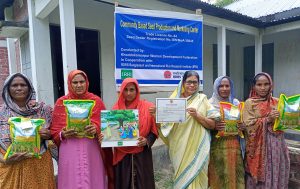 Khoddokumarpur women producer group
Khoddokumarpur women producer group
Provision of Inputs
In the first year, the farmer groups were provided foundation seeds, fertilizers, pesticides, and packaging materials free of cost. Subsequently, they purchased good quality seeds from reliable sources, mostly the federations. The group-based approach to the seed business made them more confident.
Dealer-farmer-linkage Meetings
The dealer-farmer-linkage meetings, introduced producers to potential seed dealers to help them market their produce. The events were mostly organized at the district level to collectively train all the rice growers (of the partnered federations) together. Sometimes, the events are conducted at different locations to allow the farmers exposure to various machinery and equipment, and demonstration plots.
Exposure Visits
Field exposure visits are also an important part of the training programs as the women learn from successful seed production units. During such visits, they get an opportunity to observe the varietal trials and crop cafeterias, and compare several varieties. Such informal gatherings help in the sharing of knowledge and experiences between women farmers. These visits create awareness of newly released varieties and their performance.
Demonstrations and Trials
Demonstrations and trials in the fields of seed producers are often the best way to offer practical experience. Therefore, IRRI engaged with the farmers in on-farm field trials (OFTs) and cluster demonstrations (CDs) as a means to train them further and create awareness of new varieties suitable for the region. A cluster demonstration on five to ten hectares was arranged by pooling neighboring plots of selected members for the collective management and evaluation of newly tested varieties. Such demonstrations offered practical knowledge and collective learning on QSP to the women farmers.
Through head-to-head adaptive trials (HHATs) that are conducted in different ecological zones, the performance of newly released varieties is compared to popular old varieties. During these trials, newly developed, benchmark, and farmer-grown varieties were cultivated in the same plot to compare their performances closely. These trials and demonstrations helped in identifying promising varieties in the target environments based on feedback from the farmers and generated demand for the new improved varieties. During the feedback sessions, farmers expressed their willingness to cultivate their choice of new varieties in the next season and enquire about the seeds. These trials were also conducted in close collaboration with organizations like the Bangladesh Rice Research Institute (BRRI), Bangladesh Institute of Nuclear Agriculture (BINA), Bangladesh Agricultural Development Organization (BADC) and extension personnel to keep them informed about farmers’ choices and possible future demand.
From 2019 to 2023, each of the two groups were engaged in 12 CDs and more than 10 OFTs. Nearly, 1,200 farmers in Gaibandha district and 1,500 in Rangpur district witnessed these demonstrations and trials. During the same period, 23 new varieties (released between 2010 and 2020) were promoted by IRRI among the rice farmers in Rangpur division. All the promoted varieties have one or more preferable traits like high yield, stress tolerance, nutrition enriched, and aroma, and some are green super rice.
Table 1: Varieties promoted among rice farmers.
| Variety name | Release date | Important trait | |
| 1 | BRRI dhan51 | 2010 | Stress tolerant |
| 2 | BRRI dhan52 | 2010 | Stress tolerant |
| 3 | BRRI dhan58 | 2012 | High yielding |
| 4 | BRRI dhan67 | 2014 | Stress tolerant |
| 5 | BRRI dhan71 | 2015 | Stress tolerant |
| 6 | BRRI dhan72 | 2015 | Nutrition enriched |
| 7 | BRRI dhan74 | 2015 | Nutrition enriched |
| 8 | BRRI dhan75 | 2016 | Green super rice |
| 9 | BRRI dhan76 | 2016 | High yielding |
| 10 | BRRI dhan79 | 2017 | Stress tolerant |
| 11 | Binadhan-17 | 2015 | Green super rice |
| 12 | BRRI dhan80 | 2017 | Aromatic |
| 13 | BRRI dhan81 | 2017 | Premium quality |
| 14 | BRRI dhan84 | 2017 | Nutrition enriched |
| 15 | BRRI dhan87 | 2018 | High yielding |
| 16 | BRRI dhan88 | 2018 | High yielding |
| 17 | BRRI dhan89 | 2018 | High yielding |
| 18 | BRRI dhan92 | 2020 | High yielding |
| 19 | BRRI dhan93 | 2020 | High yielding |
| 20 | BRRI dhan94 | 2020 | High yielding |
| 21 | BRRI dhan95 | 2019 | High yielding |
| 22 | BRRI dhan96 | 2019 | High yielding |
| 23 | Bangabondhu dhan 100 | 2020 | Nutrition enriched |
Despite elaborate training and exposure, end-to-end supervision and technical assistance are prerequisites for new seed growers. Hence, the groups were aided in the selection of varieties and supply of seeds, land preparation, adoption of recommended sowing practices and spacing, transplantation, implementation of plant protection measures, harvest, monitoring moisture content, and storage.
Strengthening Organizational Capacities of Groups
Beyond technical training, the project placed emphasis on team building, communication skills, and decision-making abilities. Such abilities are considered imperative while choosing presidents, secretaries, and other important members. IRRI and RDRS also aided the groups in the election of their leaders, treasurer, secretary, and members of the Seed Management Committee (SMC) for the smooth and efficient functioning of the seed production business.
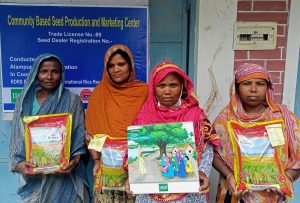 Alampur women producer group
Alampur women producer group
Strengthening Seed Marketing
Seed marketing is another important aspect of the seed production business as sales proceeds are used to recover costs incurred in the previous season as well as to invest in the following season. Therefore, the groups are also educated on seed certification and licensing processes and linked with the Seed Certification Agency (SCA) and dealers. Seed certification helps in branding and commercial marketing and ensures better returns. Both groups obtained the license for certified seed production from SCA after successful quality monitoring protocols. Apart from RDRS and SCA, IRRI has partnered with government bodies like BRRI and BINA for the supply of nucleus and breeder seeds to the farmers, and with BADC for foundation seeds. BADC also engages seed producers as contract growers for the procurement of certified seeds to meet the demand in the region.
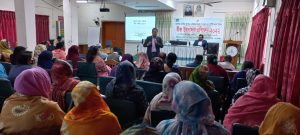 Training on Seed Certification organized by Seed Certification Agency at Gazipur
Training on Seed Certification organized by Seed Certification Agency at Gazipur
CHALLENGES
Financial constraints: A majority of the women farmers engaged in the model are small or marginal farmers. This brings with it financial constraints like the inability to own costly machinery and the urgency to sell produce to meet cash requirements. Further, the cost of labor and irrigation is high, which increases production cost. Labor requirement during transplantation and harvest is high and the cost of hiring labor is higher because of the demand-supply gap. Farmers also incur high labor costs for roguing, as its frequency is high in QSP to avoid contamination by other seeds.
Maintaining quality: QSP requires more diligence than customary crop production. Adoption of recommended package of practices during production, processing, and storage is crucial for quality assurance. Farmers with poor knowledge of the ideal practices run the risk of bringing down the quality of produce. A moisture meter determines the accurate moisture content of the produce and helps maintain an optimum moisture content of 14% and 12% for short and long-term storage needs, respectively. The price of the instrument is high (USD 120 -200) and farmers can’t afford it. Where they use traditional methods of moisture estimation leading to deterioration of seed quality during storage, farmers usually buy fresh seeds at an additional cost for the next season’s cultivation.
A SWOT analysis of the seed producer groups is presented in Figure 1.
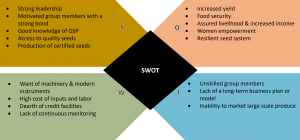 Figure 1. SWOT analysis of the seed producer groups.
Figure 1. SWOT analysis of the seed producer groups.
IMPACT
The enhancement of their knowledge of quality rice seed production is one of the most direct impact on the women group members as this will be diffused to other farmers in the region and create an environment for a self-driven seed system. Between 2019 and 2022, the Khoddokomorpur women’s seed producer group produced nearly 18,000 kg of high-quality seeds of new varieties that reached 6,000 farmers. The Alampur group produced 14,000 kg of new and improved varieties which were purchased by 2,900 farmers.
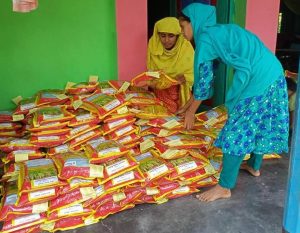 Alampur Federation Members preparing seed bags for sale
Alampur Federation Members preparing seed bags for sale
According to the women groups, CBRSEM has promoted reliable social relationships among the members, ensured easy availability of new rice varieties and quality seeds, and boosted their income. These benefits, as perceived by the members, have led to food and economic security, and empowerment. For these women, reduced dependency, the authority to make decisions, and social stability are big achievements. The range of impacts is illustrated in Figure 2.
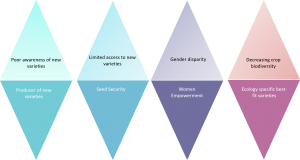 Figure 2. Major impacts of CBRSEM.
Figure 2. Major impacts of CBRSEM.
LESSONS LEARNT
Given the range of inputs required for QSP, from quality seeds and fertilizers to labor and machinery, and the constant diligence, the business necessitates higher investments than a usual rice crop. Also, manifold challenges include the dearth of cash, labor, machinery, and uncertain pricing. There is also the risk of less skilled members not contributing as efficiently as the trained ones. Unless these lacunae are addressed, the sustainability of the models could be a challenge.
Regular training programs are essential to keep farmers updated about new technologies and skill sets, and more importantly to address their emerging needs. It will help them refine their practices. Some training programs should focus only on entrepreneurial skills and challenges to attain operational efficiency. As the individual training of members in large-sized groups is not possible in the same event, the focus should be on capacity building of less skilled and untrained members in subsequent training events so that they are at par.
Timely access to inputs, not just seeds but also sources of irrigation and procurement of fertilizers and quality pesticides is important for scaling production, as increased productivity and cost optimization are closely related. Helping the groups avail of credit facilities and benefits offered by the government can improve their investment capacity. Such groups may further benefit from association with developmental organizations or NGOs that are working towards the promotion of entrepreneurship among women farmers, and who provide the groups with a stronger voice and access to affordable resources. The NGOs can replicate the role that RDRS has played in mobilizing farmers, organizing their trainings through experts, and monitoring their activities.
Gaining access to a wide customer base through linkages to a network of buyers and knowledge of the right pricing can ensure fair returns to the seed producer groups. In the future, these entrepreneurship models should ideally be linked to existing public sector interventions. It can enable and expedite the procurement of licenses for seed businesses. Moreover, these farmer groups can be engaged as contract growers on a large scale for seed multiplication programs by ensuring the supply of quality inputs and the purchase of the produce. The National Seed Board (NSB) can educate and monitor the groups for high-quality seed production through the field and variety testing standards.
END NOTE
Community-based seed production systems are grassroots-level entrepreneurship models that rely on collective strength and cooperation. Nurturing local women’s groups in quality seed production can empower them both socially and economically and promote varietal diversity. Moreover, it addresses some basic concerns like food security, rural prosperity, and climate-resilient agricultural practices and production. However, in the absence of a sustainable model, the many benefits may not be long-lasting. This underlines the need to channel the expertise of experienced women farmers towards entrepreneurship through training and assistance to serve as an example for community-led development. Inducing young and middle-aged women rice producers can prove beneficial, given their higher education levels, quicker ability to learn, and grit and enthusiasm to face challenges.
 Muhammad Ashraful Habib is Lead Specialist, Seed System & Product Management at IRRI Bangladesh. He can be reached at (Email: m.habib@irri.org)
Muhammad Ashraful Habib is Lead Specialist, Seed System & Product Management at IRRI Bangladesh. He can be reached at (Email: m.habib@irri.org)
 Swati Nayak is Scientist and South Asia Lead for Seed Systems in IRRI and Global Lead for cereal seed systems in the CGIAR initiative, Seed Equal. She can be reached at (Email: s.nayak@irri.org)
Swati Nayak is Scientist and South Asia Lead for Seed Systems in IRRI and Global Lead for cereal seed systems in the CGIAR initiative, Seed Equal. She can be reached at (Email: s.nayak@irri.org)
 Subhasmita Mohapatra is a Seed System & Product Management Consultant at IRRI India. She can be reached at (Email: subhasmita.irri@gmail.com)
Subhasmita Mohapatra is a Seed System & Product Management Consultant at IRRI India. She can be reached at (Email: subhasmita.irri@gmail.com)

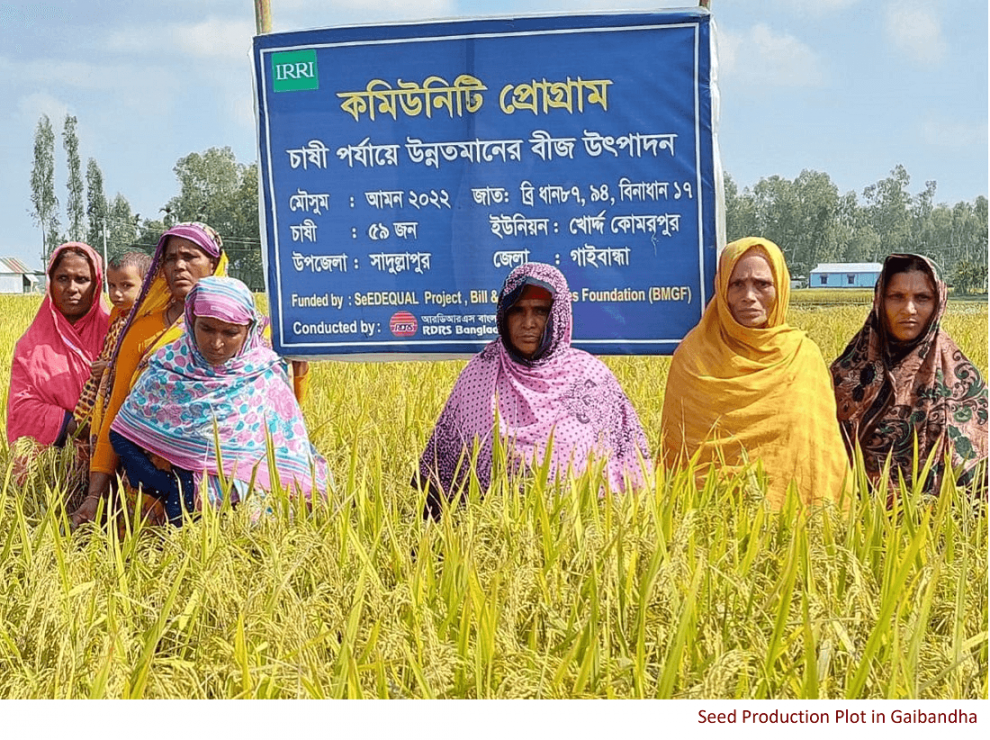

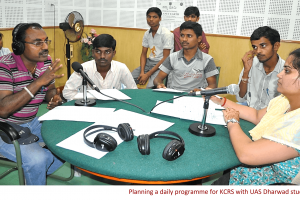
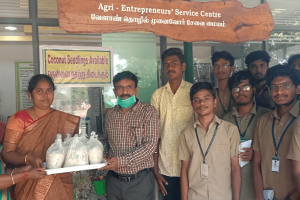
Add Comment